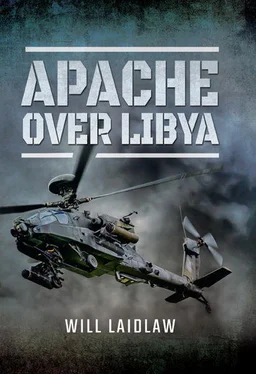‘Okay… this is a really nasty system. SA-6 can be brought to readiness from being hidden and shut down in under ten minutes. Once ready, a well-drilled crew can have a missile off the rail and winging its way towards you in around ten seconds. That makes it something you want to look out for. Of course we won’t see it, but the first indication we’ll get is a voice alarm announcing “SA-6 Searching”, or worse, “SA-6 Tracking” if it’s a good crew remaining undetected until the last second.’
I interrupted. ‘The assumption is that anything big like this that’s still around this long after the No Fly Zone began is a survivor. A talented survivor.’
Charlie concluded, ‘If you get either of those Searching or Tracking tags in the cockpit you have seconds to get the chaff out and get away. Seconds… this is a match for anything that flies.’ He took a red pen and wrote on the whiteboard:
Source: Wiki. SA-6. Finds U @ 50 miles. Launches @ U @ 15 miles. Missile goes @ Mach 2 – 2.8. Duck, dive, run. Chaff! Chaff! Chaff!
He signed it off with a smiley face.
Unusually, we had two days to plan the raid. Down in the flip-flop we examined the satellite images and the maps. The plan was going to need precision timing and sufficient flexibility to adjust those times if things changed on the night. I needed two patrols of two aircraft each, one to go deep into the desert and hook round to the southern targets and the other to stay feet-wet and hit the port. I opted for the southern patrol and took callsign ‘Jilted’. Nick was point man for the port and took on callsign ‘Underdog’.
My route would not be complex but it was long, and this meant fuel would be tight and delays could be costly. The usual 30 nautical mile sea track would be followed by 30 nautical miles over the desert to a holding point about 5 miles from the first target area. The aim was to get to the holding point one minute before the fast jet strike went in west of the town. That way we would not waste fuel waiting, and the surprise of emerging out of the desert from the south would be intact. Underdog could afford to leave Ocean after us and make the straight 30 nautical mile sea track to a feet-wet holding point. Arriving one minute before the bombs went in gave us precious time to select our first targets. At the moment the bombs struck the warehouse and the radio mast we would launch our first missiles. Then the real fight would begin.
At the point where I considered the fight to be over, or at a specified fuel state, I would call our departure and each patrol would turn north and track the 20 nautical miles to the pre-arranged recovery point. This meant we would need 900lb of fuel to get us back on deck with our minimum landing fuel. That night we privately agreed to make the decision to head for Mother at 1,200lb. Mark Hall and John Blackwell had planned this ‘for the wife and kids… just in case’. An extra 300lb of reserve fuel, that’s almost 15 minutes of flying or 30 nautical miles, our whole return sea track and then some. These were wise heads, tuned to the hazards of combat at sea.
The time on target was agreed with the CAOC and everyone went about their planning. We organized the planning across all ten of the aircrew; no one was spare and we still had daily maintenance to complete in order to get the aircraft ready for the mission. In the afternoons two of the crews would conduct the air testing, ensuring the guns were still accurate, the engines perfectly tuned, the radios all working and the flares and the radar faultless. The rest planned. In the evenings we all continued the planning until the small hours, and then bed. I insisted that we all stay in night mode so that we would be at our best between 8.00 p.m. and 4.00 a.m. – the time bracket for all our missions in Libya. This meant sleeping from 5.00 or 6.00 a.m. until 1.00 or 2.00 p.m. The rest of Ocean continued in Defence Watches, eight hours on, eight hours off, as they had since mid-May. Some people, particularly the Commodore’s team and key personalities on the ship’s company, were ‘one of one’, with no ‘oppo’, and had to work long days without a break, even when alongside. The CO was one of those. He would start shaping the mission after breakfast, work through the day building the plan, be part of the mission brief, follow the progress once the patrol had launched, manage the guntape debrief and mission review and finally get to bed between 2.00 and 5.00 a.m.
For the Brega raid we had the ‘No Go’ items all ready and Underdog had a drone assigned. Everything was in place: targets seen; plans of attack designed (a coordinated attack at the same time as the French went in); times agreed and rehearsed; fuel and weapons loaded. Risk was studied. We called it ‘medium’. It was a ‘Go’.
On 24 June Ocean was back in combat mode. In the early evening watches had changed over, fresh eyes were on station. Eight aircrew were alone with their thoughts. It was an early strike that night, back in time for the midnight meal. I was excited and anxious as usual. Wherever I was in the ship I felt alone and on the edge of death. When I ate I was alone in my head; when I stepped out on to the quarterdeck in the tranquil sunset I was willing the fight to come on. I wanted to get going and get on with it. And I was afraid.
After the final checks and authorization were complete I signed for the aircraft, walked out on to the flight deck and climbed into the front seat of the front Apache. The deck was full. Four fully armed Apaches, each with a five-man team of ground crew soldiers, two engineers and a marshaller, sat lashed to the 600ft of flat top. CJ’s team had provided exactly what we needed, with nothing spare. Any technical problems now would see a patrol cancelled. There must have been forty people on deck all aiming to get those aircraft into the sky.
I strapped in, noted we were heading north into wind, and spoke to John Blackwell: ‘On in the front. All good?’
‘Problems with the whole missile warning system, boss. Engineer is on his way.’
‘Okay. Any others?’
‘Yes, the radios seem a bit weak. Same engineer will take a look.’
We had a whole load of ‘greeny’ problems – electrical issues. The aircraft had woken up all grumpy. The wise head of the electrical specialists tapped on the window, plugged his headset into the wing stub and said, ‘You’ll have to do a full shut-down and restart. See if that clears it.’
John Blackwell re-set the systems and closed down the aircraft. I noted the time; we needed to be off in 15 minutes to make the time on target. I tore a sheet of paper from my kneeboard pad and wrote ‘Rolex 20. New TOT 2120Z’. With a completely silent flight deck, all radars and radios off or in listening mode, we used a runner to get messages to and from the Operations Room.
While the Rolex was being negotiated John and I rebooted the aircraft and the engineer diagnosed and fixed the faults to see us safe into battle. All the while Ocean was still heading north.
After twenty minutes of frantic work by the engineers we were ready to go. My patrol launched into the black. The delay and northerly course for launch had put us an additional 17 nautical miles from our intended launch point. I quickly calculated the time needed to get to the holding point. The southerly track with a tailwind would help, we could cut a corner here and there and just make it on time. We’d have a bit less time on target, but all things being equal we’d be back on deck in under two hours.
This assumption would later bring John Blackwell, Mark Hall, Charlie Tollbrooke and me within a hairsbreadth of crashing into the sea.
‘Head one-seven-zero. One hundred, one hundred, buster.’ Head just left of south, both aircraft at 100ft, maximum speed. We were racing into Libya again. Maximum power, maximum fuel burn, let’s get there!
Читать дальше












